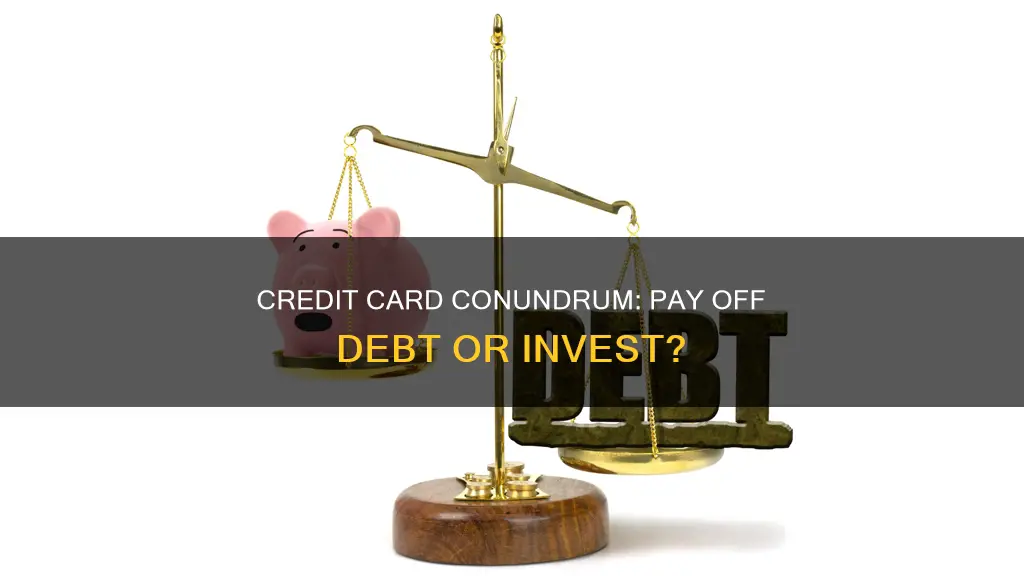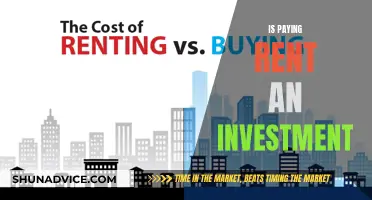
Whether to pay off credit card debt or invest depends on your individual circumstances. If you have high-interest credit card debt, it often makes more sense to focus on wiping out the debt as quickly as possible, rather than trying to invest. Credit cards often carry the highest interest rates, so if you're carrying a lot of credit card debt from month to month, you should focus on paying that off first. However, if you have a low-interest credit card, you can wait to pay off that debt and instead invest your money where it can grow faster than interest accumulates.
| Characteristics | Values |
|---|---|
| Interest rates | Credit cards have higher interest rates than stocks, mutual funds, or other investments. |
| Returns | Paying off high-interest credit card debt will likely provide a better return than most investments. |
| Risk | Investments are volatile and carry increased risk compared to paying off debt. |
| Peace of mind | Paying off debt can reduce stress and anxiety, improving your mental health. |
| Credit score | Paying off debt can improve your credit score, making it easier to borrow money, rent an apartment, etc. |
| Retirement | It is generally best to avoid bringing debt into retirement. |
| Emergency fund | It is recommended to have an emergency fund before investing or paying off debt. |
| Tax benefits | Some debts, like student loans and mortgages, offer tax incentives. |
| Budgeting | Creating a budget and reducing discretionary spending can help you pay off debt and invest. |
What You'll Learn

The pros of paying off debt first
- Improved credit score: Paying off credit card debt improves your credit utilization ratio, which is a significant factor in your credit score. A better credit score can help you secure better interest rates on future loans, such as for a mortgage or car loan.
- Save money on interest: Credit cards often have high-interest rates, and the longer you hold credit card debt, the more interest you will pay over time. By paying off credit cards first, you can prevent high interest charges from accumulating.
- Improved cash flow: Eliminating debt means you will have more money in your budget to save and invest. It can also help improve your cash flow, allowing you to achieve other financial goals and improve your overall quality of life.
- Peace of mind: Being free from credit card debt can provide a sense of relief and reduce the stress associated with debt.
- Reduced temptation to spend: Paying off a credit card and removing it from your regular financial routine can help lower the temptation to build up debt again.
- Better investment returns: If your debt has a high-interest rate, it may be more beneficial to pay it off first before investing. This is because the potential investment returns may not outweigh the interest you are paying on your debt.
Investing: Timing the Market
You may want to see also

The pros of investing for retirement first
- If you can earn more interest on your money by investing it than your debts are costing you, then it makes sense to invest. For example, if you have a mortgage with a 5% interest rate and you invest in a stock market index fund that is returning 10% per year, you will benefit by investing your extra cash in the index fund.
- If you have a long investment horizon, the returns on your investments are likely to outpace the interest on your debt.
- Investing in a tax-advantaged account, such as a 401(k) or IRA, can provide tax benefits that make investing more attractive than paying off debt.
- Investing for retirement can help you take advantage of compound interest and grow your wealth over the long term.
- Investing in the stock market can provide higher returns than paying off low-interest debt, such as a mortgage or student loan.
- Investing first can help you build a nest egg for the future, ensuring you have sufficient funds for retirement.
Investing: Is It Right for Your Money?
You may want to see also

How to do both
How to Pay Off Credit Card Debt and Invest at the Same Time
Establish an emergency fund
Before you start investing, it's important to have an emergency fund in place. This will help you avoid racking up more debt if you're faced with unexpected expenses. Aim to save enough to cover at least three to six months' worth of expenses.
Prioritize paying off high-interest credit card debt
High-interest credit card debt can be costly over time and challenging to pay off. Focus on paying off credit cards with the highest interest rates first. This will save you money in the long run.
Consider debt relief options
If you're paying off large debts, a low-cost debt management plan can help simplify your bills and lower your debt. A debt management counsellor can negotiate with creditors to reduce your monthly payments and interest charges, freeing up money for investing.
Find ways to increase your income
Consider taking on a side hustle or a second job to boost your income. This will help you eliminate debt more quickly and generate extra cash for investing.
Stick to a budget
Review your monthly expenses and cut back on discretionary spending where possible. Look for subscriptions you no longer use or areas where you can reduce costs, such as streaming services or car insurance.
Choose the right investment options
When investing, consider options that offer the potential for growth while managing risk. Diversify your portfolio and stay invested for the long term to increase your chances of building wealth over time.
Automate your investments
Many employers offer retirement plans such as 401(k) or 403(b) with matching contributions. Take advantage of these by contributing enough to qualify for the full match. You can also automate your investments through robo-advisors or brokerage accounts.
Stay disciplined and consistent
Paying off debt and investing simultaneously requires discipline and consistency. Create a budget and stick to it, making sure to allocate funds towards both debt repayment and investing each month.
Monitor your progress
Regularly review your finances and adjust your strategy as needed. Track your credit score and monitor your investment portfolio to ensure you're on track to meet your financial goals.
By following these steps, you can work towards paying off your credit card debt while also building your investment portfolio. It's important to stay disciplined and consistent, and you may need to make some sacrifices along the way. Remember to celebrate your progress and adjust your strategy as your financial situation evolves.
Deadly Investments: The Human Cost
You may want to see also

The case for investing
While paying off debt and investing are both important financial goals, investing for the future is crucial. There are several reasons why investing may be a good idea, even if you have credit card debt.
Firstly, if you can earn more interest on your money by investing it than your debts are costing you, then investing makes sense. For example, if you have a mortgage with an interest rate of 5% and you invest in a stock market index fund returning 10% annually, you will make a profit. However, if you have credit card debt at a higher interest rate, it is better to pay that off first.
Secondly, there is the concept of compounding interest, which is interest earned on your interest. The earlier you start investing, the more time works in your favour. For example, if you open a Roth IRA at 25 and invest $6,000 per year, by 65, your money could be worth $1.28 million, assuming a 7% annual return, thanks to compounding interest. If you wait five years to start investing, that figure could drop to $796,000, a difference of almost $500,000.
Thirdly, there are tax benefits to investing. Student loan interest and mortgage loan interest are tax-deductible, reducing your taxable income.
Fourthly, if you have a low-interest credit card or other debt, the money you could earn by investing in stocks or mutual funds could outweigh the interest paid on your debt.
Finally, if your employer offers a 401(k) retirement plan with matching contributions, investing in this could be a good idea. If your employer matches your contributions, you are getting a 100% return on those dollars, which is a much higher rate than you would get from paying off credit card debt.
In conclusion, while paying off credit card debt is generally a priority, there are several compelling reasons to consider investing instead, or at least at the same time.
Apple: A Wise Investment Right Now
You may want to see also

The case for paying down debt
There are several good arguments for choosing to pay down debt rather than investing. The first is that you might come out ahead if your debt carries a high interest rate. That's especially true with credit card debt. The average interest rate on credit cards is around 20%, and few investments can match that rate of return.
Another solid reason to pay down debt involves your credit score. Your credit score can affect your ability to borrow money in the future, as well as other aspects of your life, such as insurance premiums and employment opportunities. Paying off debt, particularly if you have a lot of it, can be a smart move for this reason alone.
If you're losing sleep over your debts, then you could be better off repaying them—even if you might get a better return on your money by investing. Debt can be a significant source of stress and anxiety, which can negatively impact all areas of life. Paying it off can give you peace of mind and allow you to focus on other financial, personal, and family goals.
Additionally, if you have delinquent accounts or accounts in collection, it's crucial to work on paying those off before investing or paying off other debts. These delinquent accounts can hurt your credit score and affect your financial well-being for years. The faster you can get current on these accounts, the better.
FI Seekers: Investment Strategies
You may want to see also
Frequently asked questions
It depends on the interest rate of your credit card debt and your risk tolerance. If your credit card debt has a high interest rate, it's generally better to pay it off first because it costs more over time and can be challenging to pay off. However, if you have a low-interest credit card debt, investing your money could be more advantageous, especially if you have a high risk tolerance.
Paying off credit card debt with a high interest rate first can save you money in the long run. It also improves your credit score, which is crucial if you plan to take out loans in the future. Additionally, eliminating credit card debt can provide peace of mind and reduce stress associated with debt.
Investing early allows you to take advantage of compounding interest, which can significantly increase your returns over time. Investing also provides the potential for higher returns compared to the interest rates on some credit cards. Furthermore, investing can help you build wealth and achieve long-term financial goals, such as retirement planning.







